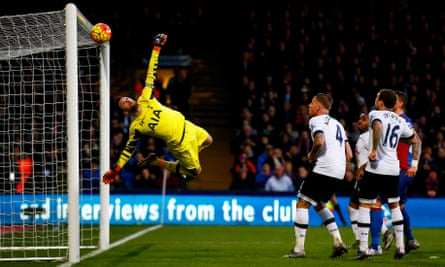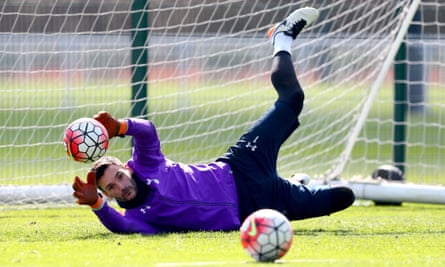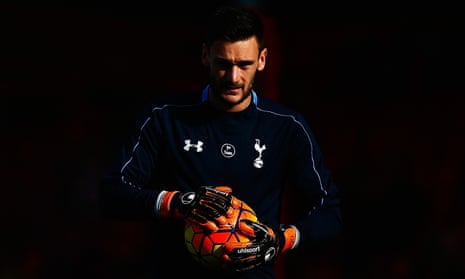There is at least one respect in which it is easy to imagine Hugo Lloris emulating Danny Blanchflower, the last player to captain Tottenham Hotspur to the league title. Back when Spurs were closing in on the double in 1961, producers of the TV show This is Your Life decided to dedicate a programme to the man leading the way on the pitch, but when the camera crew and the celebrated host, Eamonn Andrews, turned up to surprise Blanchflower with what was usually received as a touching honour, the player shot them an unimpressed look before silently walking away. The snub convinced the producers not to film the show live again.
Lloris would probably be even more reluctant than his predecessor to take part in such a show. Whereas Blanchflower, no shrinking violet, objected out of principle to what he later described as an invasion of privacy, Lloris seems naturally uncomfortable in the spotlight despite his captaincy duties with club and country. But do not confuse discretion with weakness.
Lloris exerts a strong influence beyond his spectacular saves. Frédéric Antonetti, the former Nice manager who introduced Lloris to the French top-flight over a decade ago, put it well when, long before a season in which the goalkeeper is attempting to regain the English crown for Tottenham before lifting the European title for France, he said Lloris would become a splendid captain because “a good leader is not the person who talks the most, it is the person who talks the most sense”.
Lloris talks sense and team-mates listen. And TV producers have learned that they, too, should listen and talk sense when referring to him. In his debut season at Lyon following his €8.5m transfer from Nice, when commentators in France were first starting to talk about the then 23-year-old emerging as the best goalkeeper in the world, the popular weekly show Téléfoot asked Lyon for permission to use footage from the club’s channel of the goalkeeper doing one of the famously intense training sessions with the former France No1 Joël Bats. Lloris vetoed it. He relented months later but imposed two conditions: the feature could not run for more than two minutes and must contain “no sensationalism about being the best goalkeeper in the world”.
Lloris’ performances, however, hardly helped subdue hype, remaining so sensational he was voted the Ligue 1 goalkeeper of the year at the end of that season and twice more afterwards before moving to Spurs in 2012. It is certainly no exaggeration now to class him among the best in the world, a status that savvy observers always sensed he would reach.

“I first saw him when he was about 12 years old and he came to Nice for a trial with five or six other keepers,” says the former France goalkeeper and Nice coach Dominique Baratelli. “Straight away we coaches turned to each other and said: ‘Don’t waste time, sign him up now.’ Already as a youngster he had something that most kids just don’t have. What struck me most strongly and immediately were his anticipation and his reading of the game. He made extraordinary saves, of course, but most of all he took intelligent initiatives. He had an innate understanding of when to come off his line and even sometimes out of his box to join in play like an outfielder. Fabien Barthez was the first well-known French goalkeeper to be so assertive off his line but I’ve never seen a 12-year-old do it as well as Hugo did. He was directing teams from the back even then.”
He is still doing it. He may be self-effacing when it comes to publicity but that does not diminish his eagerness to exert control. On the contrary. He has an undemonstrative drive similar to Pete Sampras, the American tennis champion who, along with Eric Cantona and Peter Schmeichel, was the sportsman Lloris says he most admired when growing up, tennis being his other sporting passion. He radiates calm authority through his performances and brings order through his timely instructions.
Jan Vertonghen, more than adequately replaced by Kevin Wimmer since being injured in late January, and Toby Alderweireld are high-class centre-backs but Spurs would not have the best defensive record in the league if Lloris were not such a vigilant organiser and so effective as a sweeper, regularly dashing off his line with the speed of a top tennis player sprinting from the baseline to the net. Even so, Lloris is often called on to make improbable saves. His extraordinary stop from a close-range shot by Jonas Olsson of West Bromwich Albion in December was, according to the opposition’s goalkeeper Boaz Myhill, “the best save I’ve ever seen in real life”. Spurs fans have grown accustomed to seeing them.
Spurs surprisingly lost the league game after that West Brom match, Newcastle inflicting the club’s first league defeat in four months when Ayoze Pérez and Aleksandar Mitrovic came off the bench to inspire a shock away win. After the match Lloris addressed the Spurs squad, encouraging every player to take more responsibility. His words carried real weight, as Danny Rose explained some weeks later, after a victory over Swansea.

“After the Newcastle game, their two subs either scored or contributed to the goals, and Hugo said when our subs come on, they have to be ready to either chase the man down or try to win us a goal,” Rose said. “The first example of that for me was Palace away. Nacer Chadli came on and we ended up winning 3-1, albeit from a world-class goal from Dele Alli. Against Swansea he came on again and managed to contribute to us getting three points. If you’re not playing you have to be ready to step in at any moment and thankfully everyone has done that.”
Lloris delivered the words with the quiet force of one who does not need to bawl to gain respect. Mind you, he can shout if need be. The lingering suspicion in France that he was a tad meek – fuelled by his and others’ nonintervention in the France squad’s disintegration at the 2010 World Cup in South Africa – was exploded in 2011 by footage captured by a camera in the tunnel of Lyon’s Stade de Gerland. After a match in which the home side let their title chances slip by giving away two late penalties against Nice, Lloris was caught berating two team-mates for having been “scared shitless” and failing to “respect the jersey”.
While that proved Lloris could deliver rollickings when required, it also showed something else: the goalkeeper’s increasingly deep hunger for a trophy to go with all the plaudits. Lyon went on to win the French Cup that season, but that remains the only significant trophy he has won. Now 29, his craving is far from sated. Tottenham can not afford to slip up at Liverpool on Saturday if they are to overhaul the Premier League leaders, Leicester City.
Lloris has admitted there was a point a couple of season ago when he started to doubt he could win anything with Tottenham, saying the sudden switch of manager from André Villas-Boas to Tim Sherwood did not reflect a club in control of its destiny.
“I had not felt a strong club but rather an unstable one, with a coaching change in the middle of the season, just the opposite of what I like to see in football,” he said last year before explaining Mauricio Pochettino’s rigour and vision gave the club “new benchmarks” and helped convince him to sign a five-year contract in the summer of 2014.
The fact the respect between player and manager went both ways was then proven by the Argentinian’s appointment of Lloris as captain – a far more obvious choice than his decision to award the armband to Younès Kaboul the previous season. Even so, if Real Madrid had succeeded in prising David de Gea from Manchester United this season, then the Tottenham chairman, Daniel Levy, may have had to draw on all of his reputed powers of negotiation to stop Lloris from heading to Old Trafford.
As it turns out, by staying put Lloris and Tottenham have moved themselves closer to winning the trophy for which they both yearn.

Comments (…)
Sign in or create your Guardian account to join the discussion